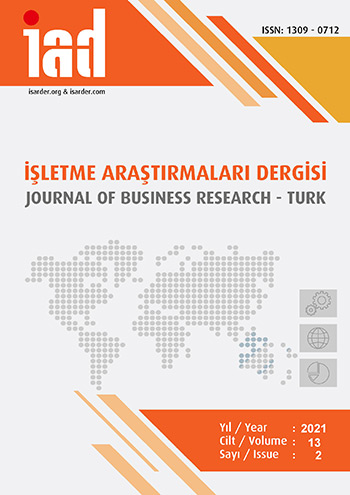A Research on the Effects of Intellectual Capital on Business Efficiency
DOI:
https://doi.org/10.20491/isarder.2021.1209Keywords:
Intellectual Capital, Business Efficiency, TechnologyAbstract
Purpose – The purpose of this research is to examine the effects of intellectual capital on the productivity of businesses. Therefore, in this study; What are the effects of demographic differences (gender, age, marital status and education) of individuals on intellectual capital and productivity of businesses? Determining the positive aspects in the applications, what are the problems encountered and what can be the measures related to the detected problems? Findings and suggestions on the subject were presented to the relevant parties.
Design/methodology/approach - In this study, the relational survey model, which is one of the quantitative research methods, was used. In order to obtain the data, 2 scales, namely "Intellectual Capital Scale" and "Business Efficiency Scale", were used with questions measuring demographic characteristics. S.S. MASKO Istanbul Furniture and Wooden Goods Manufacturers Business Cooperative İkitelli Organized Industry, a questionnaire was applied to 464 people working in the manufacturing and sales stores of the enterprises that continue their activities in Başakşehir. As a result of the questionnaire applications, frequency, reliability, anova and regression analyzes were made using the data related to the answers received from the participants, and the determined research hypotheses were tested.
Results – When the regression equation obtained as a result of the regression analysis is examined, it can be said that when the score of structural capital increases by one unit, the productivity score due to education will increase by 0.084 unit. In other words, structural capital positively affects educationrelated productivity by 8.4%. In addition, it positively affects the time management efficiency perception of customer capital by 14.0%, in other words, improvements in customer capital increase time management efficiency.
Discussion – It motivates the human capital of businesses, encourages them to produce many innovative ideas, increases their competitive success and can ensure the continuity of businesses. Therefore, one of the important issues that business managers should pay attention to in the process of business behaviors with innovative ideas is that they should increase business efficiency by protecting strategically important employees. It should be taken into account that conducting field-applied scientific studies on the effects of intellectual capital on the productivity of enterprises can provide significant benefits. Therefore, through the analysis of the data obtained as a result of the analysis of this research; The effects of intellectual capital on the productivity of enterprises have been researched, current problems have been tried to be determined, the increase of positive practices has been expressed, new suggestions have been developed as much as possible and applications that will increase the productivity of the enterprise are proposed.
Downloads
Published
How to Cite
Issue
Section
License

This work is licensed under a Creative Commons Attribution-NoDerivatives 4.0 International License.





